Dr. Jamiu Oluwatoki, Senior Lecturer, Department of History and International Studies, Lagos State University (LASU), Ojo, in this interview with EMEKA ALEX DURU, DANIEL KANU and TEMITOPE DAVID-ADEGBOYE, looks at the international dimensions of the recent government GDP rebasing exercise, Boko Haram insurgency, as well as Nigeria’s perceived dwindling fortunes in foreign relations
Dr. Jamiu Oluwatoki
The federal government, recently, carried out what it called a rebasing exercise by which Nigeria is now rated the 26th fastest growing economy in the world and the first in Africa. Do you see the exercise situating properly with the situation in the land?
When we are talking of the growth of the economy in a country or the Gross Domestic Product (GDP) as it is traditionally known, it is a statistical thing and statistics is nothing but figures. But when we are talking about the life of a people, we are talking about the standard of living and cost of living. So, it is very possible the data and statistics can tell us that we are among the fastest growing economies. But the real question is: how does it relate to the human development index (HDI)? How does it touch on the lives of people? An economy that is fast growing and is competing with that of the other parts of the world cannot be something of great joy when we have, perhaps, fast growing rate of youth unemployment in the country. As in many parts of the so-called third world, Africa and the Middle East, the most active percentage of the bulk of our population are in the 30-year bracket. These are able-bodied young men and women who will contribute a lot to the economy and then they are out of jobs; they are out of school. There is no prospect for their getting something doing, even by being self-employed. So you can declare the rosiest GDP in the world, but it does not tally with the reality of the lives of the people. An economy that will not translate to the well-being of the people is not an economy we can be too happy about, though on the papers the figures can say it is robust. Perhaps, it is good news to those in government, but it is not good news to Nigerians.
How do you think this will impact on our perception outside considering that, recently, the World Health Organisation (WHO) rated Nigeria among the countries with poorest citizens?
At the end of it all, we have to realise that most of these figures that are bandied about are also figures that are based on international best standards. But in other climes, when you have this type of GDP, they have so much in their system that takes care of hiccups. But we are in a country where the ruling class, I want to believe, is on a suicide venture. They do not care about the people and do anything that will make things easy for the people who will work harder to make the economy better. So, if leaders all over the world are doing so many things to make their economy translate to better life for the people (and we are not doing same), it will mean that the world will be laughing at us; that we are actually not serious a people even with the economy that we say is growing, because if economy is growing and is not translating to the good life of the people who actually have to work harder to sustain it, it means it will one day fall like a pack of cards.
The analogy is straight-forward about taxation. Taxation is such that people will bring something back from the opportunities the society has given them to grow the society; but when you are over-taxed, sooner or later productivity will fall because nobody wants to do all the work and not get anything out of it. It will mean that people will not be very productive; it will mean also that we have this regime of impunity that people do whatever they like that at the end will collapse the economy itself. The world will not be happy with us that we are just discussing having big GDP while actually we are not doing the right thing for that economy to be sustainable.
Nigeria has been angling for a permanent seat at the United Nations Security Council, amid a gale of insecurity it has had to contend with. The other day, for instance, we had a terrorist attack in Abuja. Where does that place the country in its quest for international recognition?
This issue of international terrorism is a trend that started long ago. In today’s world, there are so many groups, agents that always react to state terrorism, so to speak. But at the end of it all, the state has responsibility to take care of the welfare of its people. There is terrorism all over the world, no doubt about that; but Nigeria seems to be setting new records of, perhaps, being the most terrorised state with a government that seems to be helpless. But it is not helplessness; it is recklessness and carelessness, because at the end of it all, the government has machinery to know a lot. Government knows a lot by virtue of its security agencies; but the question that baffles us is how serious is government in using information at its disposal?
Terrorism is all over the world, yes; but we have a situation in Nigeria where it seems as if we have no inkling on how to handle matters, so that you want to wonder whether these terrorists are part of machinery of state or what? This is because at the end of it all, there is nothing that happens that a state does not have grip on. But what surprises one would be that sometimes it would seem as if rather than networking with other parts of the world to combat this terrorist menace, it seems as if everything about handling it is dependent on what other states do, like what America and Israel do. Meanwhile, like the African proverb, it is the child that raises his hands that the mother carries.
How much are we being ready to get to the root of the matter? And what are the factors that make it happen? You know that, perhaps, Nigeria has the most porous frontiers in the world. If we talk about the great walls of China, the great walls in Zimbabwe, the ancient Kano walls, the Benin moat, it is not new to us that we can have security arrangements, fortresses around the country. If you get to the end of Chad or Niger, you don’t even know where Nigeria begins and ends; you don’t know who gets in, who gets out. But we have a state with security agencies; we have Interior Ministry. It can only mean that those in charge of running the country do not really care about security, even when security and survival are basic to any organism within a state.
If you don’t have security, you cannot survive, and without survival, you cannot talk about security. But while every state is working hard to nip in the bud what actually would constitute security threat, our own is like when it happens we are caught napping. We should not forget that insecurity is not only in the military sphere. Threat to security has different spheres. It can be political, economic, psychological or cultural. So, when we talk about security threat, we may see this menace of Boko Haram; but it has dimensions that affect everything Nigerian, in terms of how people respect us, in terms of how people are ready to come and invest their hard-earned resources here, in terms of how sacrosanct is life, to Nigeria or to Nigerian government.
You spoke on the porosity of our frontiers. Don’t you see the fluidity of movement having to do with the Economic Community of West African States (ECOWAS) protocol on free movement?
ECOWAS protocol on free movement does not allow for impunity. There are still checks about who you are. If I am an ECOWAS citizen, what it means is that I am not persona-non-grata in Ghana, in Togo or in Cote d’Ivoire; but it does not mean that I am left free to run riot. That is not the idea. The idea is that you should not curtail the movement of people just as we should not curtail movement of goods and services. But it is not to say that state operatives should not check whether you are genuine or not, because at the end of it all, if the idea is that because you are ECOWAS citizen, you can just move as you like, then it means that you can just move in and out and do whatever you like without the state being conscious of whether you mean well or not. If we allow free movement to make business thrive, then we will be doing the opposite of what we want to achieve; if the businesses that thrive can just be rubbished in a day by some hoodlums or by some miscreants who, under the guise of free movement, disrupt not just the business of individuals but the economy of the state.
Some blame the trend on failure of intelligence.
When you talk about intelligence, you cannot be too blatant about it because it is a restricted area. So, the answer may be yes or no. Yes because we can do better than we are doing. We know that sometimes, though, our intelligence agencies may not say it because it is against the ethics of their profession: when they don’t get enough to work with in terms of funds, it is not in their tradition to say it out; they just do the best they can in such circumstance. But I can assure you; they can always do better if they are given the opportunity to do better. That is on one side. On another side, I will like to be contradicted; that when intelligence agencies give information to government, they are acted upon promptly. I will not use Nigerian case as example, but you would agree with me that the same thing happens all over the world. The 9/11 (September 11, 2001) attack on the United States (U.S.) was not that the U.S. did not know that it was coming, but the problem of inter-agencies sharing information. CIA (Central Intelligence Agency), FBI (Federal Bureau of Investigation) and others had information vital in combating the situation, but they held on to it separately. They didn’t work together, and then America was caught napping. That is also happening in Nigeria. I am saying it with emphasis that it is happening in Nigeria because we conduct studies.
Do you suspect external involvement in the entire thing?
We are in a world that has now interconnected a lot. What we should start asking our government is: how much external influence does it have that is not making it work hard on combating the menace? I feel uncomfortable when Nigeria will seem to hand over everything about fighting the menace to America, Israel or to other countries. We can collaborate with them, learn a lot from their own experiences, but it must not seem as if we are leaving our own house to be guarded by others because we know the terrain more than others.
At what point did we get it wrong that Nigeria appears to have lost her voice despite all it had done as big brother for other African countries?
It is customary that people say that Nigeria’s Afrocentric foreign policy was misplaced, and that Nigeria is not getting anything out of it. As a student of International Relations, and being well aware of this Eurocentricism in looking at the world, I don’t subscribe to this idea of whatever you want to do for others must be tied to something you want to get back. It is not African.














